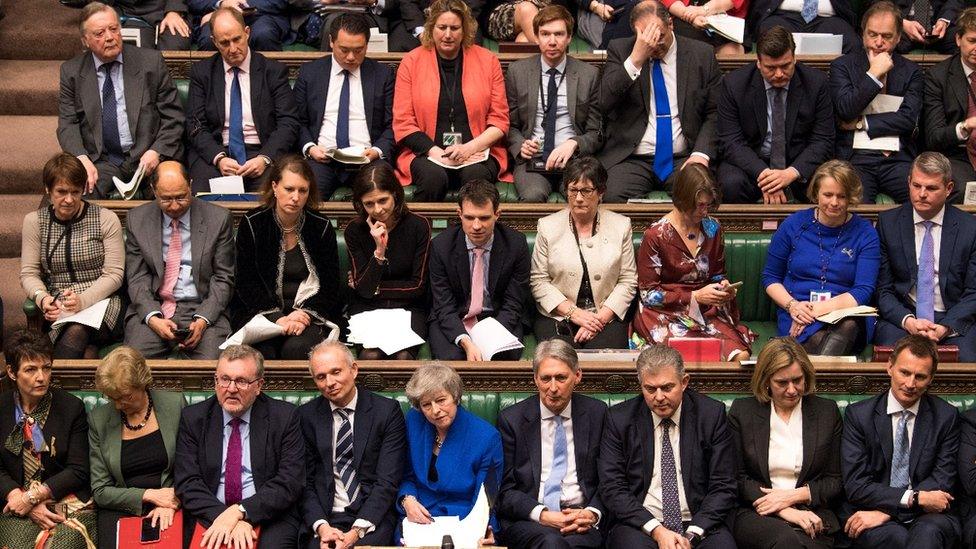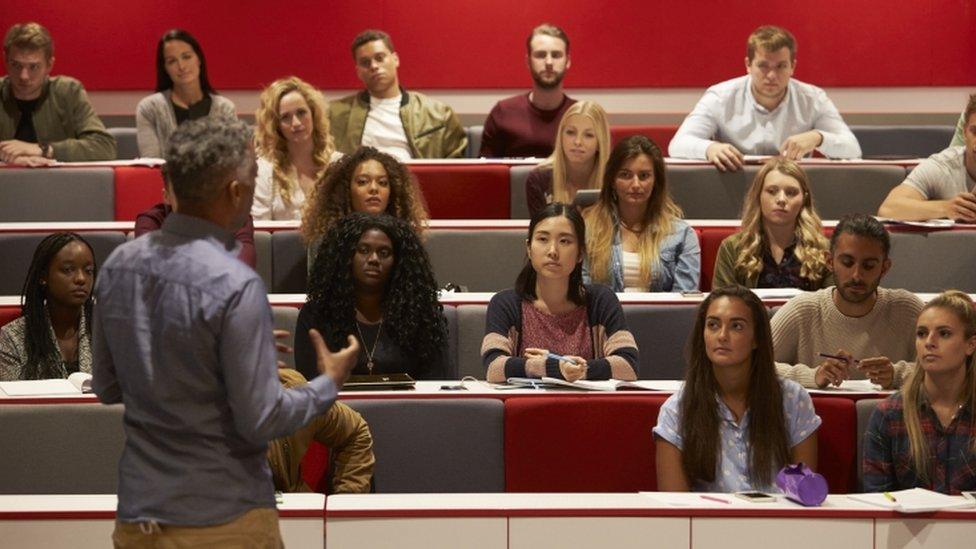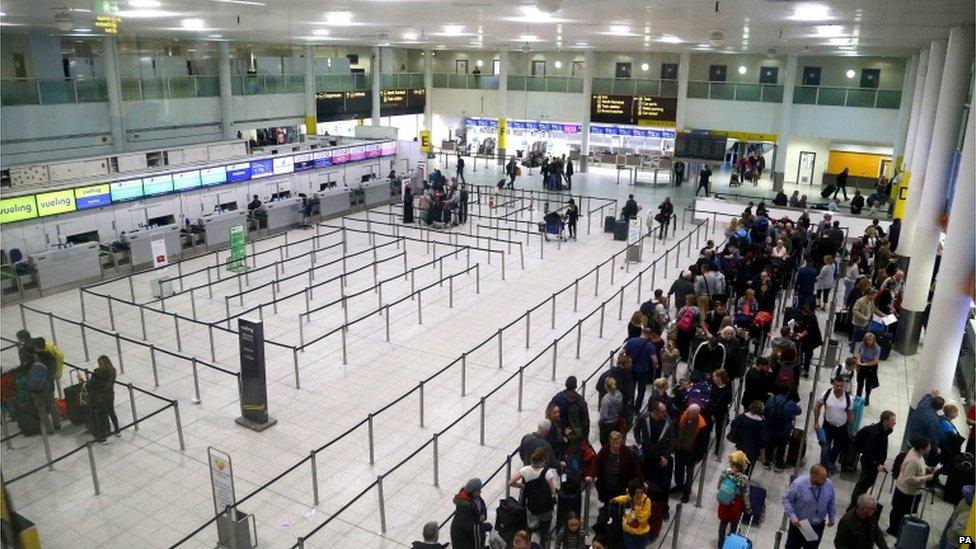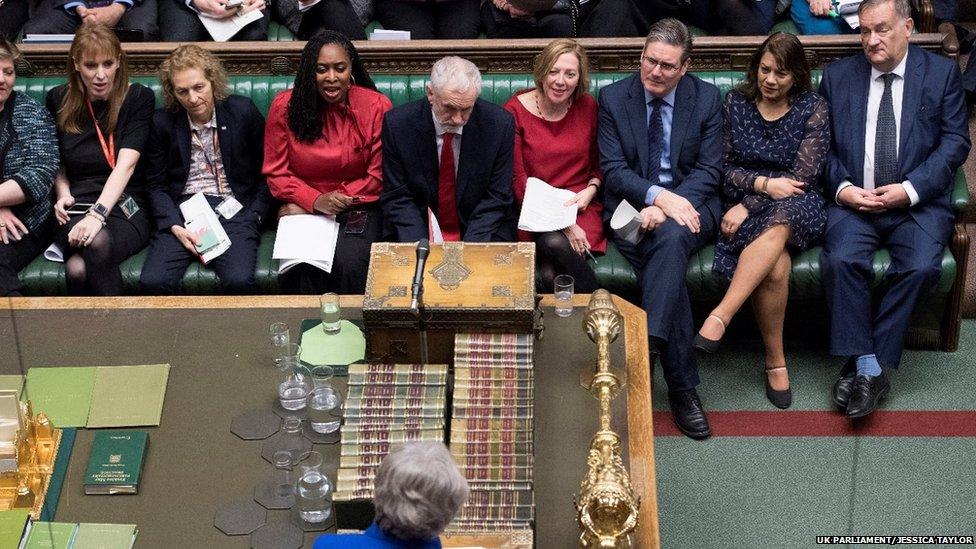Week ahead in Parliament
- Published
- comments

Judging by the agenda for Westminster, next week will be the calm between the storms - a kind of phoney war interlude before the debate due on 29 January, when MPs debate future Brexit strategy, and almost anything could happen.
Theresa May is due to make another Brexit statement on Monday - but as I write there seems little indication that anything will change in her approach, so it's expected to be another Groundhog Day Brexit statement, with the same questions receiving the same answers.
Otherwise it looks like a week of more humdrum legislating, with any further dramas likely to come from (as yet) un-timetabled events like ministerial statements.
It is also possible that rebellion could spill onto the floor of the Commons if there was any hint of a move to keep Britain in a customs union indefinitely or to postpone Britain's departure date, by seeking an extension to the Article 50 period.
An important Brexit sub-plot is the sudden rash of presentation bills - Nick Boles's proposal to rule out a no-deal exit has been overtaken by a refined version of his proposal from Yvette Cooper; Dominic Grieve has two bills down to bring in a further referendum, and it may not be long before the Brexiteer camp gets in on the act with some proposals of their own.
In normal times, presentation bills are little more than parliamentary performance art - a way of making a point - but there is a thought out there that MPs could move to suspend the rules which allow the government to control what they debate, and give some of these measures the debating time necessary to pass them.
Big constitutional change is often driven by political crisis and if this actually happened, it could change the course of Brexit and reboot the relationship between the government and Parliament.
Here's my rundown of the week ahead:
Monday 21 January
MPs warm up (2.30pm) with an hour of Home Office questions, and then the prime minister is expected to deliver an update on talks to find a Brexit deal capable of being passed by the Commons. Any further ministerial statement or urgent question would have to be pretty pressing, because these Brexit exchanges typically take two or three hours, for all that they seldom yield much that is new.
Next, MPs will deal with the report and third reading stages of the Healthcare (International Arrangements) Bill, a Brexit bill which establishes the legal framework for reciprocal healthcare schemes and data sharing after the UK leaves the EU.

In Westminster Hall (4.30pm) there's a Petitions Committee debate on e-petition 229744, external calling on the government "increase college funding to sustainable levels, including immediate parity with recently announced increases to schools funding. This will give all students a fair chance, give college staff fair pay and provide the high-quality skills the country needs."
On the committee corridor, the Public Accounts Committee has an apparently unpromising-looking session (4pm) on the Bank of England's central services - but there may be some fun to be had with the Bank's 700 job titles and high personnel costs. The committee may also have some fun with the Bank's money-printing operation....are they spending too much money on making money?
In the Lords (2.30pm) questions to ministers include one on government discussions with the BBC about ending free television licences for those over 75.
Then, peers move on to the long awaited committee stage consideration of the Trade Bill, external - where the Labour Leader, Baroness Smith of Basildon, plans an interesting manoeuvre.
She will attempt propose an amendment to the usual motion to go into committee on the bill, adding a requirement that the committee's report be not received until the government has presented to both Houses proposals for a process for making international trade agreements, once the United Kingdom is in a position to do so independently of the European Union.
Trade treaties could have huge implications and she will be calling for a stronger role for Parliament and the devolved legislatures and administrations in drawing up negotiating mandates and vetting a final agreement. And if her amendment is agreed, the Trade Bill will go into limbo, after committee consideration, until such a report appears.
On the bill itself, the key issues for discussion on day 1 include general procurement agreements and existing standards and rights. And proceedings may be interrupted to allow a minister to repeat the PM's Commons statement. The dinner-break mini-debate is on metrics to measure UK poverty, led by the Conservative Baroness Stroud.
Tuesday 22 January
MPs open (11.30am) with an hour of Foreign Office questions.
The day's Ten Minute Rule Bill, from the SNP's Alan Brown, is the Green Deal (Conduct of Home Energy and Lifestyle Management Ltd) Bill; there have been a series of Commons debates on the way this company has operated the government's scheme to provide energy improvements.
Then MPs turn to Lords amendments to the Counter-Terrorism and Border Security Bill. Among other things peers voted through changes to the rules banning British citizens from entering "designated areas", like terrorist training camps or areas under the control of organisations like IS. Exceptions have been added for people providing humanitarian aid, working for the United Nations or working as a journalist.
In Westminster Hall (9.30am) Labour and Co-op party MP Gareth Thomas leads a debate on the future of the water industry - he wants to see "a meaningful change in ownership" by mutualising the industry, which he believes will put consumers and employees in the driving seat and make the water industry fit for the environmental, investment and financial challenges it faces.
The Conservative Matt Warman leads a debate on cashless transactions (11am) - he will argue that the move away from physical cash to digital payments provides huge opportunities for increased security and decreased tax evasion but also poses challenges, particularly for some vulnerable groups.
The SNP's Angela Crawley has a debate on mental health and the benefits assessment process (2.30pm ). She says the process for making a benefits claim on grounds of mental ill health, and the appeals process can be gruelling and appears to use a tick-box exercise based on an outdated model of mental illness rather than following the recommendations of mental health organisations.
At 4.30pm, the Labour MP Helen Goodman has a debate on freehold estate fees - she had a ten minute rule bill to cap the fees, last year, and is returning to the issue of new housing where owners find the fees demanded by the freeholder of the property ratchet inexorably upwards. She will be calling for the government to act to control the problem.
My committee picks are the Science and Technology Committee on Japanese Knotweed in the built environment (9.45am) and the Home Affairs hearing on English Channel migrant crossings (10.30am).

Drone sightings closed Gatwick Airport last month
In the Lords from 2.30pm, questions to ministers include former education secretary Lord Blunkett asking about funding for children with special education needs - and Lib Dem Baroness Randerson on new regulations on the use of drones - she asked an urgent question about the drone disruption at Gatwick Airport.
The rest of the day is devoted to considering a series of Brexit-related Statutory Instruments, including four on nuclear and three Defra SIs - regulations on Invasive Non-native Species, Conservation of Habitats and Species, and Floods and Water.
Wednesday 23 January
MPs begin with Wales questions (11.30am) followed at noon by Prime Minister's Questions.
The Conservative, Michael Fabricant, has a Ten Minute Rule Bill to ensure there are regular updates to the Ancient Woodland Inventory using new technology to include woodlands under five acres (two hectares) which are mostly not registered at present.
The number of all threatened ancient woodlands is now at 811 according to the Woodland Trust. He warns that HS2 is going to destroy at least 56 hectares of ancient woodlands including some around his Lichfield constituency.

Jeremy Corbyn and Theresa May will face each other at PMQs again this week
Then the House moves on to consideration of Lords amendments of the Tenants Fees Bill, external, which aims to make renting fairer and more affordable for tenants by reducing the costs at the outset of a tenancy. Three hours have been set aside, including time to allow the Lords to respond should the Commons reject their amendments, but even so, this is suspiciously light business, so it may be that some additional item is added to the Commons agenda - perhaps the announcement of the long-awaited Domestic Violence Bill.
In Westminster Hall, debates include Labour's Siobhain McDonagh on FTSE 100 company pay ratios (9.30am); Plaid Cymru's Westminster Leader Liz Saville Roberts on the widowed parent's allowance (11am) and the Conservative Lee Rowley on a balanced budget rule (2.30pm) - he wants to highlight that the UK national debt continues to rise, albeit much slower than a few years ago, and he wants to talk about ways to stop borrowing money that future generations will have to pay back.
My committee pick is the Public Accounts session with Amanda Spielman, HM Chief Inspector of Schools, looking at Ofsted's inspection operation (2.30pm). The PAC has previously criticised single-day inspections as ineffective, and urged that schools rated as "outstanding" should face more regular inspections - rather than be assumed to be excellent on the basis of what may be an out of date appraisal by inspectors some years before.
In the Lords (3pm) questions to ministers include Baroness Anelay on the risks from Chinese ownership of technologies and platforms critical to UK domestic infrastructure. Then peers are expected to resume their committee stage consideration of the Trade Bill - where the key issues include devolution and customs union.
Thursday 24 January
The Commons day opens (9.30am) with Exiting the European Union questions, followed by Business questions to the Leader of the House of Commons - will the open hostilities between the Leader, Andrea Leadsom, and the Speaker continue?
The rest of the day is devoted to debates selected by the Backbench Business Committee - starting with a general debate on Holocaust Memorial Day 2019. The theme of this year's memorial day is "torn from home", which will give MPs a chance to discuss the impacts and effects of persecution, the loss of family or place of safety, and the challenges that survivors had in rebuilding their lives afterwards.
That is followed by a debate on a motion on appropriate ME treatment., external
In Westminster Hall (1.30pm), Labour MP John Cryer leads a debate on tackling knife crime.
In the Lords (11am), question time includes former UKIP leader Lord Pearson of Rannoch asking about the Brexit negotiations - and the rest of the day is devoted to debates on subjects chosen by Lib Dem peers - first, on the delivery of essential services; and the second on the threats to climate change.
The lunch-time mini-debate is on social and human rights issues in the Philippines.
Friday 25 January
Neither House is sitting, but, unusually, there is a select committee hearing: the Women and Equalities Committee is holding an evidence session (2pm) on abortion law in Northern Ireland, at Queen's University Belfast. They will hear from the Northern Ireland Department of Justice and Department of Health, Marie Stopes Belfast, the Northern Ireland, Royal College of Midwives and the Christian Medical Fellowship.
- Published30 July 2019

